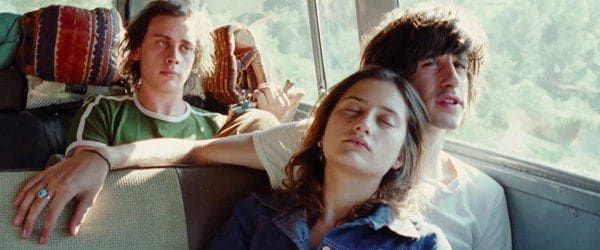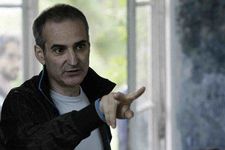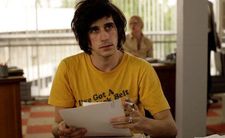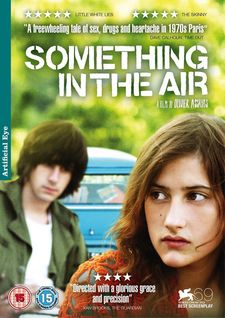 |
| Something In The Air - 'It's very difficult to be nostalgic about one's own youth. To me, the experience of youth is frustrating.' |
After almost a year of taking the film around the world, are you feeling a bit rebellious towards it yourself at this point?
Yes, I am. My main problem with it is that I don't believe that much in filmmakers explaining what they've done. I think that a lot in movies is better left unexplained. I think in the end filmmakers do speak to much about how they do it and why they do it and it can spoil the mystery of the stories. So, you should be making movies with big stars with celebrated stars so that you don't have to get too much into the mechanics of the film.
Much of your film is open to interpretation. The characters are, in a way, blank slates, certainly at the start of the movie. They're all in the flush of youth that we all go through, where you're not quite the character you're going to become so you try a lot of characters on for size. The film is also about commitment, as much to yourself as to a cause.
 |
| Olivier Assayas on the set of Something In The Air |
It's like an inner revolution within yourself?
Yes, I think it's something that happens within every generation. But when you did that in the 1970s, you were not only breaking with your group, you herd, you were also betraying the idea of the revolution. You were betraying the solitariat, you were betraying the generous ideas of forming the society which was how you connected with your friends, so it was twice a betrayal and twice as painful.
In a sense, you were perhaps being more radical in turning against the received ideas?
It is the one genuinely radical thing to do but, at the same time, it's not the way your friends see it.
You've said parts of it are semi-biographical. When you are doing that, are you consciously aware of the fact that you're drawing on real people and does it make you slightly nervous to do that or is it just something that you embrace?
I was a little nervous, I have to admit, when I was representing the two central women characters, Christine and Laure, because they are painfully close to the models. One is dead and the other one I've completely lost touch with but, in both cases, anyone who knew me in those years could see through that stuff, and eventually in painful ways. So there was a tiny bit of embarassment. The other characters... even though I'm representing myself somehow, there is a distance. Seriously, there is more distance because the actors bring different energy and a different way of moving with them. Sometimes it was very close but I did not feel any kind of unease about it. I had the sense that somehow cinema transformed it into fiction.
When it came to the actors themselves - they're a generation from the 90s. The current generation is much more cynical, I think, about politics in general and perhaps more conservative, with a small c.
 |
| Clément Métayer in Something In The Air - 'Even though I'm representing myself somehow, there is a distance.' |
What do you think your teenage self would have made of the film. Do you think he would have liked it?
I've had a strange experience, which I have written about. When I was young, I watched The Devil Probably (Le Diable Probablement) by Robert Bresson. I saw the film in probably 1976 or 1977, I was 22 at the time and it represented kids of my generation. I was shocked. I thought the film was completely irrelevant. I respected Bresson but I thought, 'Oh my God, how wrong is he? He has just no idea.' I saw the film again 10 years later and I just could not believe it, because it was the truest - the film that came closest to recreating those times - it was absurd. When I saw it originally, I didn't want to see it, it was just too close to home. But now, when I am thinking of the kid I was in the Seventies, ultimately the cinematic image that comes to me is the character in The Devil Probably. It's disturbing. How could I not see it? I wonder.
Your film is not at all nostalgic. It's the opposite if anything.
It's very difficult to be nostalgic about one's own youth. To me, the experience of youth is frustrating. It's a moment of indecision, of doubt. You're out there in the big world and you don't know exactly where your place is or how you're going to find your own path. When I was a teenager, I couldn't wait to become a grown up.
There came a moment for me that I really wanted to make movies and painting and making movies were not compatible. And that ultimately, if I wanted to learn about movies, I might as well do whatever job comes and learn whatever I can learn. So I ended up just doing these set job. I was working on a machine, stamping numbers on film stock on the editing for the Richard Donner's Superman. I would get there at dawn, leave in the evening, be happy to work on Saturdays because it was overtime and I got better pay. I was a kid and it was my one experience of factory work. One part of it was fun - when they were shooting Superman, I was around the sets and Christopher Reeve was walking around from one set to another in his cape. But, of course, it was completely cut off from any reality I knew. It was the mid-Seventies in London, what was going on in the street was exciting. There was a modernity I felt part of. I was working on a movie but it might as well have been made 30 years before that, because it had nothing to do with anything I could relate to. I had this sense of beginning working in the film industry at its most archaic.
You sound as though you were fired up about it at the time and that sense of the flammable energy of youth is present right through your film. You've been on a bit of a Seventies jag recently. Do you feel you're going to move away from that period now?
Yes, the next film [Sils Maria] is back to the present. I would be shooting this summer. I'm fed up with the Seventies, also I'm fed up with period filmmaking because it complicates your life on every single level. You can't take the camera and shoot on the street, you can't do this, you can't do that. It's a different energy.
 |
| Something In The Air was released on DVD and Blu-ray in the UK on August 26 |





















